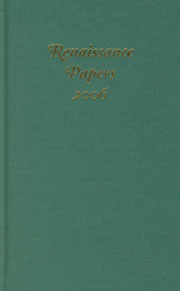Book contents
- Frontmatter
- Contents
- Renaissance Papers
- Youthes Witte: An Unstudied Elizabethan Anthology of Printed Verse and Prose Fiction
- The Power of Association: A Study in the Legitimization of Bianca Cappello through Medici Matriarchal Portraiture
- Vindicta and Vindiciae on the Early English Stage: Imagining Revenge through Huguenot Resistance Theory
- Breaking the Head of the Serpent: Women's Childbirth Prayers in The Monument of Matrones
- “Conquered nations mean nothing in love”: Political Dissent in Propertius's Elegy II.7 and Donne's “Love's Warre”
- Correcting Double Vision in The Comedy of Errors
- Lear's Awakening: Texts and Contexts
- The Power of Fantasy in Middleton's Chaste Maid: A Cost/Benefit Analysis
- Invariant Paratexts in English Dramatic Texts
- Milton and Forgiveness
- Samson at the Fair
- The End of Samson Agonistes
Milton and Forgiveness
Published online by Cambridge University Press: 12 September 2012
- Frontmatter
- Contents
- Renaissance Papers
- Youthes Witte: An Unstudied Elizabethan Anthology of Printed Verse and Prose Fiction
- The Power of Association: A Study in the Legitimization of Bianca Cappello through Medici Matriarchal Portraiture
- Vindicta and Vindiciae on the Early English Stage: Imagining Revenge through Huguenot Resistance Theory
- Breaking the Head of the Serpent: Women's Childbirth Prayers in The Monument of Matrones
- “Conquered nations mean nothing in love”: Political Dissent in Propertius's Elegy II.7 and Donne's “Love's Warre”
- Correcting Double Vision in The Comedy of Errors
- Lear's Awakening: Texts and Contexts
- The Power of Fantasy in Middleton's Chaste Maid: A Cost/Benefit Analysis
- Invariant Paratexts in English Dramatic Texts
- Milton and Forgiveness
- Samson at the Fair
- The End of Samson Agonistes
Summary
A FEW years ago an essay of mine was published on royalist attitudes toward clemency in the 1640s and 1650s in which I found occasion to quote Milton's attack on the forgiving king of Eikon Basilike (1649): he “glories much in the forgiveness of his enemies,” but, says Milton, “Wise men would sooner have believed him had he not so often told us so.” This made for a useful contrast between royalist and republican attitudes in that essay, but I have sometimes regretted the implication that Milton's views on forgiveness were generally negative or that they were always dominated by his anti-monarchism. In fact the skeptical wise men of Eikonoklastes are only part of a story that begins in Milton's youth and continues even after his death. He not only asked for pardon on occasion as a young writer but seems also to have been willing to give it throughout his life, and forgiveness is a more important theme in his later poems than most recent scholarship would lead one to think. The days of praising Milton for his magnanimity are long gone, but a closer look at this aspect of magnanimity, one so closely related to the political realities of writing in the second half of the seventeenth century, is necessary if we are to understand the surprisingly wide appeal of his poems to readers of various parties after the Restoration.
To my knowledge Milton's earliest references to forgiveness appear in Elegy IV, in Prolusion III, in the verse to Prolusion VI, in Prolusion VII, and in a letter from the early 1630s.
- Type
- Chapter
- Information
- Renaissance Papers 2006 , pp. 137 - 150Publisher: Boydell & BrewerPrint publication year: 2007



